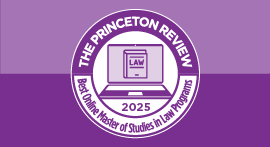LSAT vs. GRE: With More Law Schools Accepting the GRE, Which Test Is Right For You?
At the end of 2022, more than 94 accredited law schools were accepting the GRE instead of the LSAT as part of the application for admission. That number may continue to grow should the American Bar Association (ABA) continue to change its testing requirements for law schools.* The biggest takeaway for now? If you plan to apply to law school, prepare for the LSAT or the GRE. Several law schools that have been accepting the GRE for more than one admissions cycle note that they found a strong GRE score to be a good indicator of an applicant’s potential success in their respective law schools.
So which test should you take—the LSAT or the GRE?
The LSAT is designed specifically for law schools to assess the skills most needed for success in law school and is accepted at every accredited law school. If even ONE of your target schools does not accept the GRE, then focus your preparation on the LSAT. The GRE is designed for use by many different types of graduate programs. If you are unsure about attending law school versus another graduate program, or if you are looking at dual-degree programs, then you might consider taking the GRE to maximize your ability to apply to other graduate schools.
Understanding the format of each exam can help guide your decision based on your strengths, needs, and timing; use the LSAT vs GRE chart below to better understand the features of each test.
LSAT vs. GRE Structure & Scoring
| LSAT | GRE | |
|---|---|---|
| Governing Body** | LSAC | ETS |
| Test Sections |
4 Sections Logical Reasoning (35 Minutes) : two sections, multiple choice, ~25 questions Reading Comprehension (35 Minutes) : multiple choice, 26-28 questions + You will face a variable section on the test. This will not be scored. The entire exam takes approximately 3 hours, with one 10-minute intermission. LSAT Writing - an essay section that can be completed up to 8 days before the multiple-choice section. More about LSAT Sections |
3 Sections Analytical Writing (60 Minutes) : one section with two separately timed writing tasks,30 minutes per task Verbal Reasoning (60 Minutes) : two 30-minute sections, multiple choice, 20 questions per section Quantitative Reasoning (70 Minutes) : two 35-minute sections, multiple choice, 20 questions per section + You will face a variable section on the test. This will not be scored. More about GRE Sections |
| Test Format*** | Not computer adaptive. Through June 2023, remotely proctored exam; laptop with webcam and microphone required, set up in a private room (i.e. office, school room, quiet room in home, etc.). |
Computer adaptive. Find a Test Center. |
| How It's Scored |
Scored on a scale of 120–180. LSAT Writing section is not scored. If you take the exam more than once, the top law schools average the scores of all LSATs taken within the previous five years. More about LSAT Scoring |
GRE reports 3 separate scores; Math and Verbal GRE scores fall on a scale of 130–170. Analytical Writing scores range from 0–6. More about GRE Scoring |
| Test Frequency |
Through June 2023: Jan 13-14 Feb 10-11 Apr 14-15 Jun 9-10 |
The GRE is offered year-round with many location options, including “at home.” Register for the Test. |
| Cost | $215 (plus a $195 subscription to the CAS**) |
$220 |
| Score Validity | 5 years | 5 years |
Which test is easier, LSAT or GRE?
This is a very subjective question! And the answer is, it depends…If you have excellent logic and analytical reasoning skills (and perhaps want to avoid a Math section), then consider focusing on the LSAT. Though the GRE includes a Math section, Law Schools may place more emphasis on the Verbal Reasoning score. Taking practice tests will help you determine your strengths and weaknesses.
How do I choose the best test for me?
The best way to determine whether the LSAT or GRE is better suited to your abilities is to get your feet wet with a practice test for each exam. Getting into law school is competitive and you don't want to take an actual GRE or LSAT sight unseen. We offer full-length computer-adaptive diagnostic tests for both the GRE and the LSAT.
Take a Free LSAT Practice Test
* In addition to accepting the GRE, as of November 18, 2022, the ABA voted to remove the requirement for law schools that applicants take the LSAT or another standardized admissions test. This puts the testing requirements squarely in the hands of each law school, which can require the LSAT or any other test (like the GRE) or become test optional.
This decision marks a big shift in law school admissions policies, which many law admissions professionals believe will help diversify the applicant and enrollment pool. For the time being, the best course of action is still to prep for one of the tests!
** Important to note as LSAC also runs the Credential Assembly Service (CAS), which is the vehicle for submitting your law school applications. If you choose to submit GRE scores instead of LSAT, you will need to take the separate step of asking ETS to submit your scores to the schools you apply to for admission.
*** Covid impacted the delivery of the LSAT, which shifted from an in-person exam to a remotely proctored one. Through June of 2023, the LSAT will continue to be delivered in an online format; see LSAC for the latest information on the second half of 2023 and beyond.
Explore Graduate Programs for You
Explore our featured graduate schools & programs to find those that both match your interests and are looking for students like you.
Best Online JD Programs
Online JD programs offer flexibility, affordability, access to innovative technologies, students from a diversity of career backgrounds, and global opportunities.
Best Online MSL Programs
Master of Studies in Law (MSL) programs are for non-lawyers whose careers in their organizations will benefit from legal training even though they are not required to be practicing attorneys.

Find MBA Programs Matched to Your Interests
Explore our featured business schools to find those that are looking for students like you.


